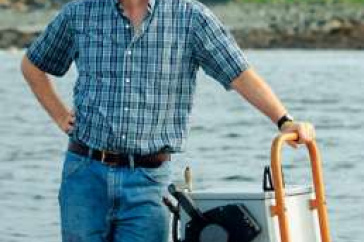UNH Professor Wins Top Prizes from American Historical Association for 'The Mortal Sea'

Caption: W. Jeffrey Bolster, an associate professor of history at the University of New Hampshire and professional seafarer, has won the 2013 Bancroft Prize for his book, "The Mortal Sea: Fishing the Atlantic in the Age of Sail." Credit: UNH Photographic Services
DURHAM, N.H. — W. Jeffrey Bolster, professor of history at the University of New Hampshire, has won the American Historical Association's 2013 Albert J. Beveridge Prize and 2013 James Rawley Prize in Atlantic History for his book "The Mortal Sea: Fishing the Atlantic in the Age of Sail"(Harvard University Press, 2012).
The annual Albert J. Beveridge Award honors a distinguished book in English on the history of the United States, Latin America, or Canada, from 1492 to the present. The James A. Rawley Prize is awarded annually in recognition of outstanding historical writing that explores aspects of integration of Atlantic worlds before the 20th century. Both prizes will be presented during a ceremony at the association's 128th annual meeting in Washington, Jan. 2-5, 2014.
The two awards are the latest in a host of awards that Bolster has received for his book. Columbia University named him one of two recipients of the 2013 Bancroft Prize for his gripping and eloquent history of the human impact on the ocean. It is considered one of the most distinguished academic awards in the field of history. The book also won the North American Society for Oceanic History's John Lyman Book Award for the best book in U.S. maritime history.
"Seeing my name on the end of the lists of the Bancroft and Beveridge prizes, which have been around since the late 1930s, still strikes me as astonishing. I'm thankful to the History Department, and also to UNH as a whole, for supporting my foray into marine environmental history. It is nice to be in a place where one can do one's best work," Bolster said.
While overfishing is often thought of as a contemporary problem, in "The Mortal Sea" Bolster reveals that humans were transforming the sea long before factory trawlers turned fishing from a handliner's art into an industrial enterprise. The western Atlantic's legendary fishing banks, stretching from Cape Cod to Newfoundland, have attracted fishermen for more than 500 years. Bolster follows the effects of this siren song from its medieval European origins to the advent of industrialized fishing in American waters at the beginning of the 20th century.
Bolster's book was selected for the Beveridge Prize from nearly 130 entries by a prize committee comprised of AHA members. The Rawley prize review committees also selected Bolster's book as their top choice from more than 50 entries.
"'The Mortal Sea'hits readers with the saline smack of the ocean, providing the most Atlantic of Atlantic histories, at once fascinating and deeply troubling. Lucid, penetrating, relentless, this book trawls deep historical research to expose the history of Atlantic fishing and its consequences," said Sarah M.S. Pearsall of Robinson College, the 2013 Rawley Prize committee chair.
Paula Alonso of George Washington University, the Beveridge Prize committee chair added, "this is a sweeping and original history that connects the consumption of North Atlantic fish during Lent in early modern Europe, to industrialization's demand for Menhaden fish oil in the 1870s, to lobster consumption today."
The Albert J. Beveridge Award was initially established on a biennial basis in 1939, in honor of U.S. Senator Albert J. Beveridge (Indiana, 1899-1911), a longtime member of the association and an active supporter of history as both a lawyer and a senator. The James A. Rawley Prize in Atlantic History was created in 1998 in accordance with the terms of a gift from James A. Rawley, Carl Adolph Happold Professor of History Emeritus at the University of Nebraska at Lincoln.
The American Historical Association is a nonprofit membership organization founded in 1884 and incorporated by Congress in 1889 for the promotion of historical studies. The AHA provides leadership for the discipline, protects academic freedom, develops professional standards, aids in the pursuit and publication of scholarship, and supplies various services to sustain and enhance the work of its members. As the largest organization of historians in the United States, the AHA is comprised of over 14,000 members and serves historians representing every historical period and geographical area.
The University of New Hampshire, founded in 1866, is a world-class public research university with the feel of a New England liberal arts college. A land, sea, and space-grant university, UNH is the state's flagship public institution, enrolling 12,300 undergraduate and 2,200 graduate students.
PHOTO
W. Jeffrey Bolster, an associate professor of history at the University of New Hampshire and professional seafarer, has won the 2013 Bancroft Prize for his book, "The Mortal Sea: Fishing the Atlantic in the Age of Sail."
/unhtoday/sites/default/files/newsroom/img/bolster.jpg
Credit: UNH Photographic Services
VIDEO
W. Jeffrey Bolster, an associate professor of history at the University of New Hampshire and professional seafarer, discusses his book, "The Mortal Sea: Fishing the Atlantic in the Age of Sail."
http://www.youtube.com/watch?v=aOSjZsR8tlY&noredirect=1
Credit: UNH Video Services
-30-
Latest News
-
April 15, 2025
-
Research Finds Rural Americans Carry Heavy Burden Accessing Social Security Benefits and InformationMarch 27, 2025
-
March 25, 2025
-
March 17, 2025
-
March 12, 2025














































